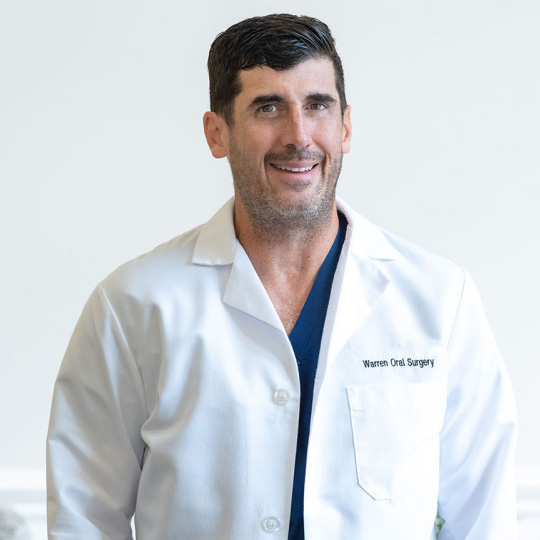
Not everyone who has lost a tooth is automatically ready for dental implants, though many people can successfully receive this life-changing treatment. Understanding what makes someone a good candidate for dental implants helps you determine if this tooth replacement option is right for you.
At Warren Oral Surgery, our team of six skilled oral surgeons has helped countless patients restore their smiles through successful implant procedures since 2004. Dental implants offer the most natural-looking and functional solution for replacing missing teeth. Unlike traditional dentures or bridges, implants integrate with your jawbone to provide a stable foundation that can last a lifetime with proper care.
Adequate Bone Density and Volume
The most critical factor for implant success is having sufficient bone in your jaw to support the implant. Your jawbone needs enough density and volume to hold the titanium post securely in place. During your consultation, our oral surgeons use advanced 3D imaging to evaluate your bone structure and determine if you have adequate bone for implant placement.
If you don’t currently have enough bone, this doesn’t automatically disqualify you from getting implants. Bone grafting procedures can often build up areas where bone has been lost, creating the foundation needed for successful implant placement. Within the first three months of tooth loss, you can lose up to 25% of the bone in the area, which is why addressing missing teeth promptly is important.
Good Overall Health
Your general health plays a significant role in implant success. Candidates should be in good overall health with no conditions significantly impairing healing. Your body’s ability to heal properly after surgery directly affects how well the implant integrates with your bone.
Certain medical conditions may require special consideration, but they don’t necessarily prevent you from getting implants. Your oral surgeon will review your medical history and work with your physician if needed to ensure implant treatment is safe for you.
Healthy Gums and Oral Tissues
The tissues around your implant need to be healthy to support long-term success. Active gum disease must be treated and controlled before implant placement. Healthy gums provide the proper environment for healing and help prevent complications like infection around the implant site.
If you currently have gum disease, addressing this condition first is essential. Once your gums are healthy, you can move forward with implant treatment with confidence.
Non-Smoker or Willing to Quit
Smoking significantly impacts your body’s ability to heal and increases the risk of implant failure. The chemicals in tobacco interfere with blood flow to the surgical site and compromise your immune system’s ability to fight infection.
While being a smoker doesn’t automatically disqualify you, quitting smoking before and after implant surgery dramatically improves your chances of success. Our team can provide resources to help you quit smoking if needed.
Commitment to Oral Hygiene
Successful implant candidates must be committed to maintaining excellent oral hygiene. While implants can’t get cavities like natural teeth, the tissues around them can still become infected if not properly cared for. This condition, called peri-implantitis, can lead to implant failure if left untreated.
Good candidates understand the importance of daily brushing and flossing, regular dental cleanings, and following all post-operative care instructions. Your dedication to oral hygiene directly impacts the long-term success of your implants.
Realistic Expectations
The best implant candidates understand what the treatment involves and have realistic expectations about the process and results. Implant treatment typically takes several months from start to finish, as the implant needs time to integrate with your bone before the final restoration is placed.
Understanding the timeline, potential need for additional procedures like bone grafting, and commitment required helps ensure you’re prepared for the journey ahead.
Age Considerations
While there’s no upper age limit for dental implants, candidates should have completed jaw growth. For younger patients, this typically means waiting until the late teens or early twenties. For older adults, age alone doesn’t disqualify someone from receiving implants as long as they meet the other health criteria.
Many of our patients in their 70s, 80s, and beyond have successfully received implants and experienced significant improvements in their quality of life.
Financial Readiness
Implant treatment represents an investment in your long-term oral health and quality of life. Good candidates understand the value of this investment and are prepared for the financial commitment involved. Many dental and medical insurance plans provide some coverage for implants, and we work with multiple insurance providers to maximize your benefits.
Why Choose Warren Oral Surgery for Your Implant Evaluation
At Warren Oral Surgery, our team of six skilled oral surgeons, including Dr. Marquis, has extensive experience evaluating implant candidates and performing successful implant procedures. Dental implants have a success rate of 95%, and our surgeons work diligently to ensure you’re set up for success from the very beginning. Our state-of-the-art facility features 15 operatories equipped with the latest surgical technology, including advanced 3D imaging, allowing us to thoroughly evaluate your candidacy for implants. Founded in 2004 by Dr. Sullivan, our practice has been redefining the surgical experience by providing exceptional, individualized, compassionate care.
If you’re considering dental implants, the first step is scheduling a consultation to determine if you’re a good candidate. Our team will thoroughly evaluate your oral health, medical history, and treatment goals to help you make an informed decision about your tooth replacement options. Contact us today to schedule your consultation with our experienced surgical team.

